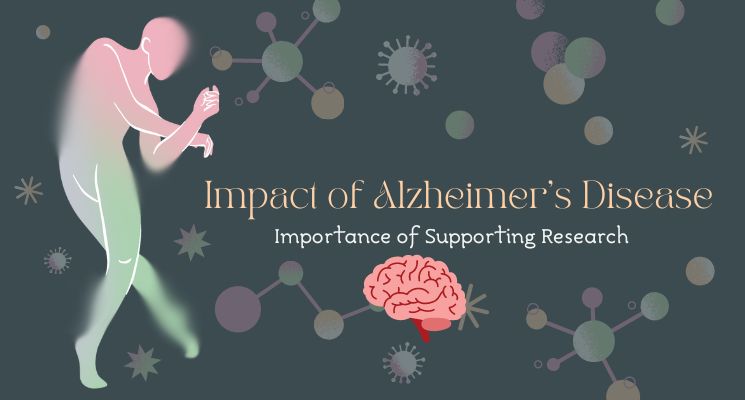Alzheimer’s disease, a neurodegenerative disorder that primarily affects the elderly, has a profound impact not only on individuals but on society as a whole. As the population ages, the prevalence of Alzheimer’s is expected to rise, highlighting the urgent need for advanced research and improved treatments. With millions worldwide living with this disease, the emotional, social, and economic toll is substantial. Understanding the far-reaching effects of Alzheimer’s is crucial in rallying public and private support for the cause. Below, we delve into the multifaceted nature of Alzheimer’s and underline the critical role of continued research.
The Current State of Alzheimer’s Research and Potential Breakthroughs

Alzheimer’s research is advancing rapidly, with scientists worldwide investigating genetic, environmental, and biological factors to understand and combat the disease. Clinical trials are crucial in testing innovative therapies that target its underlying mechanisms, showing promise in slowing or reversing cognitive decline.
Despite challenges, ongoing scientific inquiry, supported by organizations like The Fisher Center for Alzheimer’s Research Foundation, is essential for progress. Join The Fisher Center for Alzheimer’s Research Foundation’s Cause to contribute to vital research efforts and bring us closer to a world without Alzheimer’s.
Understanding the Impact of Alzheimer’s Disease on Individuals and Society
Alzheimer’s disease profoundly impacts individuals by eroding cognitive functions and everyday abilities, adding emotional and financial strain on families. Caregivers often experience high stress levels, leading to health issues. The societal impact of Alzheimer’s includes increased healthcare costs and strains on medical infrastructure. Demand for long-term care facilities and specialized professionals rises, affecting healthcare systems globally. Economic consequences include productivity loss as caregivers reduce work hours or quit jobs to provide care.
Communities are affected as awareness grows, leading to efforts to create supportive environments. Public policies are adapting to cater to the needs of Alzheimer’s patients and families, signaling a shift toward inclusivity and support. Despite challenges, there’s progress in combating the stigma associated with dementia. Organizations and individuals are advocating for understanding and support, fostering a more inclusive culture and encouraging engagement with the cause.
Exploring the Cognitive and Behavioral Changes in Alzheimer’s Patients
Alzheimer’s journey is marked by cognitive decline, starting from mild forgetfulness to severe impairments affecting memory, language, and judgment. This decline challenges communication and independence, affecting both patients and caregivers. Behavioral changes often accompany cognitive decline, presenting challenges like mood swings, aggression, and social withdrawal. These changes complicate care, requiring understanding and tailored strategies to maintain dignity.
Alzheimer’s takes a toll on patients’ mental health, leading to depression, anxiety, and decreased quality of life. Recognizing these symptoms is vital for providing appropriate support. Educating caregivers about Alzheimer’s progression helps in offering empathetic care. Recognizing cognitive and behavioral changes allows for personalized care plans to mitigate distressing symptoms effectively.
How Public Awareness and Funding Support Alzheimer’s Research Initiatives

Public awareness is key for advancing Alzheimer’s research. Educating the public through campaigns and events is crucial for garnering support and influencing policymakers and fundraising. Funding is essential for Alzheimer’s research, coming from philanthropic donations, government grants, and private investments. It sustains ongoing studies and sparks innovation.
Advocacy groups and non-profits play a vital role in directing resources towards Alzheimer’s research. They raise funds and advocate for legislation to keep dementia research a national priority. Engaged citizens amplify these efforts by participating in advocacy and fundraising. Their support boosts morale for researchers and caregivers, showing a collective determination to overcome Alzheimer’s.
The Role of Caregivers and Healthcare Systems in Managing Alzheimer’s Disease
Caregivers are crucial in Alzheimer’s care, needing both practical skills and emotional strength. Support networks and education are vital for their well-being. Healthcare systems are essential for diagnosis, treatment, and palliative care in Alzheimer’s. Collaboration among various professionals is crucial for comprehensive management.
Integrated care models, including community resources like support groups, are essential for addressing the holistic needs of Alzheimer’s patients and caregivers, leading to better outcomes. Allocating resources for Alzheimer’s care reflects societal values, with policymakers needing to prioritize funding for patient and caregiver support services.
Overall, combating Alzheimer’s demands a collaborative approach from individuals, communities, and nations. It entails grasping its effects, advancing research, aiding caregivers, and fortifying healthcare systems. Persistence and empathy will guide us towards a future free from Alzheimer’s grip on the elderly.














